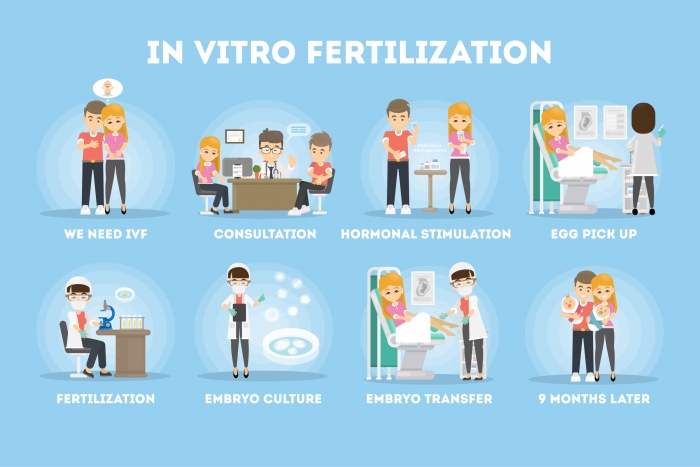
If you are having fertility issues, you may have started discussing the possibility of IVF with your doctor. IVF (in vitro fertilization) is a form of assisted reproductive technology in which a man’s sperm and a woman’s eggs are combined outside the body in a lab. The experts at Carolinas Fertility Institute can answer all of your questions about IVF and help guide you through the process. But if you have immediate questions or want more background information, we recommend the Society for Assisted Reproductive Technology for more information.
1. Ovulation Induction
The beginning of the process is, unsurprisingly, hugely important to a successful IVF cycle. This success depends on growing multiple eggs at once. To facilitate this, natural hormones like FSH and/or LG (gonadotropins) are used. Other medications can be used to prevent premature ovulation and allow multiple eggs to collect without being released.
There are several key components to ovulation induction. Each is important to make the next step in the process, egg retrieval, successful.
- You’ll be given specific instructions on what doses of which medications to take and when to take them during your cycle. Following your medication schedule to the letter, and taking exact doses are crucial for successful ovulation induction. You might want to keep a chart or other written record to keep track of your cycle and when you should take each medication, including the dose of that medication.
- Throughout your cycle, while you are taking your medications to aid in ovulation induction, you will have ultrasounds and blood tests to monitor how well the medications are working. Everyone is different when it comes to their reaction to the medications, so adjustments in either type of medication or dosage may be necessary.
- Vaginal ultrasounds will be used to monitor the growth of the follicles in which the eggs develop. These measurements will help determine when the follicles are mature enough for egg retrieval.
- Estradiol is a form of estrogen that follicles produce as they mature. Levels of estradiol are checked with blood tests to make sure the levels are rising enough in response to your medications.
2. Egg Retrieval
After your ovulation induction regimen is complete and it has been determined that your follicles have matured, you’ll be instructed to give yourself an HCG (human chorionic gonadotropin). Then, approximately 34 to 36 hours later, your doctor will put you under IV sedation and remove the eggs from the ovaries. Sedation is used to prevent pain and keep you comfortable during the procedure.
3. Fertilization and Embryo Culture
After the eggs are retrieved, an embryologist in an IVF lab will prepare them and mix them with prepared sperm. If fertilization successfully occurs, the eggs will be incubated and the embryologist will monitor them for the next two to five days to ensure proper development.
Sometimes, a procedure called Intracytoplasmic Sperm Injection (ICSI) will be recommended for fertilization. In this procedure, a single sperm is injected directly into the egg to achieve fertilization. If there is a low sperm count, low sperm motility, or abnormally shaped sperm, this method may be used to increase the chances of fertilization.
4. Embryo Transfer
After the embryos have incubated for two to five days under the supervision of the embryologist, you will come back to have them transferred into your uterine cavity. Before the procedure, your doctor will discuss with you how many embryos will be transferred. If there are any extra high-quality embryos, the doctor may suggest freezing them in case you attempt IVF again in the future.
For this procedure, the doctor will place a speculum (the same device used during a Pap smear) inside your vagina. Then with ultrasound guidance, they will insert a small catheter through your cervix into your uterine cavity. The embryos are then transferred through that catheter.
5. Embryo Implantation
About fourteen days after the day of your egg retrieval you will have a pregnancy test. If the test result is positive, that means that the embryo successfully implanted in the endometrial lining of your uterus and that you are pregnant. If it is negative, you can speak to your specialist about next steps.
With something as personal and important as having a baby and starting a family, it is difficult to remember to think about objective facts. Few situations are as emotionally challenging. But, remember that IVF is a process that can take more than one attempt. We know this can be trying emotionally and keeping your mind healthy is important to the process as well as the body. So, Carolinas Fertility Institute has teamed up with Three Birds Counseling. If you’re experiencing difficulty going through the fertility process, speaking to a counselor may help.
If you have questions or want to make an appointment, call 336-448-9100 and the experts at Carolinas Fertility Institute can help you on your journey.